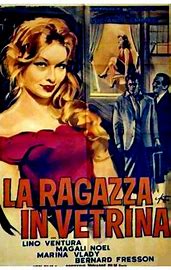The first half an hour
or so of Luciano Emmer’s undersung Girl at the Window provides no hint of
what the title might refer to, following a group of Italian immigrants as they
enter Holland to work in a coal mine, negotiating the mechanics of arrival and integration
– on the very first day, a sudden collapse seals off one of them, Vincenzo
(Bernard Fresson) with the supervisor Federico (Lino Ventura),
triggering a remarkable series of scenes in which their air supply gives out,
sounds of approaching rescue recede, and even the ebullient Federico has little
specific hope to offer. But suddenly, after several days, they’re freed after
all, and with little further reflection, the two men set off for Amsterdam,
with the object of buying some female company. Emmer provides a rich portrait
of the red-light district, emphasizing the language difficulties that many
movies gloss over, and including a matter of fact depiction of a gay bar;
Federico in particular is depicted as ravenous for booze and for women, spending
his hard-earned money with an abandon which seems like its own kind of airless
confinement. The film’s structural freshness continues as the two men part ways
(the film then focuses mainly on Vincenzo, who forges a sort of connection with
Else, played by Marina Vlady, despite the two being barely able to communicate
the simplest thing to each other), their paths meeting up again later, and
again diverging. But these expansive aspects coexist with a feeling of fate
closing in, symbolized by a recurring shot of the world receding into a tiny
square of light as the miners descend into the depths. Overall, the film
conveys a strongly tragic sense of economic and existential inevitability, but its
final note is a resigned, jocular one, a small tribute to the spirit that allows
such men to keep pressing on (albeit that this may only leave them more open to
exploitation).




